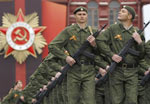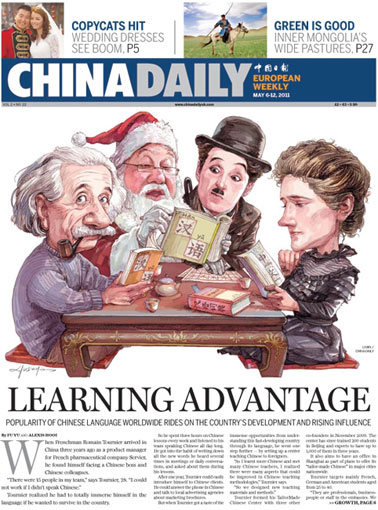High (tech) society
Updated: 2011-03-18 10:48
By Partick Whiteley (China Daily European Weekly)
Irish IT professional navigates his way through China’s Matrix
It was 2001, and Ireland had become the Information Technology (IT) hot spot of Europe. Ever since the early 1990s, the Irish government had been luring the world's biggest technology companies by offering tax-free incentives and business thrived. For companies, such as Intel, Hewlett-Packard, Dell and Microsoft, the Emerald Isle became a gateway into Europe, and as they prospered, so did a new generation of Irish with the technical know-how to make things happen.
 |
|
Garrett Nunan is part-owner of an Irish pub in Beijing, The Irish |
Garrett Nunan was one such man, who witnessed Ireland's IT bubble, and for the past 10 years has lived in Beijing witnessing changing face of technology in China.
"Ireland is called the land of saints and scholars for a reason," the 39-year-old says. "We have this history of high-end literature and we just came into our own with IT."
After leaving school in County Cork and trying his hand at sales, Nunan turned his attention to the computer industry and became a Microsoft-certified network engineer. He ran an Internet caf and later scored a three-year IT contract with the Irish government. But by 2001, Nunan and his wife were looking for greener pastures.
"We were getting out of Dublin because the cost of living was astronomical - housing, tax, insurance, your car - I was working two jobs and was doing bar work four nights a week," he says.
"Then my wife was asked if she wanted to teach in China so I rang a good friend who was already living over there and he said, 'come, this place will blow you away'."
The day Nunan arrived in Beijing, the capital had just won its bid for the 2008 Olympic Games and the city of more than 10 million people was bubbling over with joy. It was a welcome he will never forget and many myths about China were quickly dispelled.
"We came downtown the very next day and it was insane. The people were on the tops of buses, banging drums, there was fireworks the whole town just went bananas - and that was my first 24 hours," he says.
"When I thought of China I thought Mao suits, cattle, bicycles and I assumed there would be zero technology and it wasn't - I thought I had landed in Tokyo."
The Irish expat population in China is relatively small and has a close-knit nature in which everybody knows everybody and is helpful when fresh arrivals search for jobs.
"There were 74 Irish people registered with the Irish embassy in Beijing when I got here, and I remember because it was the number of my father's house," he says. "I'm not sure if it has changed quite honestly I think I know every Irish person in Beijing and possibly Shanghai.
"We all turn up at the St Patrick's Day Ball, the Irish pub and especially the embassy for Easter and Christmas. This is one time of the year when we all get together. We try to help one another out."
Within a month after arriving in China, Nunan was IT director at the United Family Hospital in Beijing, a position that would last for three years. Later he joined Hong Kong-based Pacific Media, which was setting up TV shopping in Asia and he traveled to Shanghai, Hong Kong, Taipei, Singapore and Japan as the company's chief information officer.
The next assignment was IT director for a major Chinese hotel chain and it was a real eye opener into local corporate culture.
Nunan's challenge was to get about 80 hotels into one consolidated property management system, so that bookings, vacancies, and all business transactions could be seen on one computer screen. But in cash-based business cultures like the hotel industry, many did not welcome this proposal for total transparency.
"If this was my first job in China I would have left China, but I was already seven years in and it was OK. However, it was the most difficult two years in my life," he says.
Lack of communication across departments and the constant "he said, she said" game caused the greatest headaches.
"Nobody wanted to be accountable for anything and the fear of accountability is very strong," he says.
"It was one of the only places I have worked where sales and marketing were opposing teams.
"There was no logic to it and the core problem was, 'it's not my job'."
When the economic crisis hit in 2009, the hotel cut back on staff and Nunan moved on as a consultant specializing in digital forensics, a science, which involves recovering material in digital devices that is often related to computer crime.
"Digital forensics is taking a hard drive from top executives and taking all the information he thought he had deleted and use this information in a court of law," he says.
"The more initial public offerings that come in the more financial audits happen that leads to better transparency.
"Some parts of top management don't like it, but the investors do."
On top of running his consultancy business, Nunan also has a share in one of Beijing Irish pubs, The Irish Volunteer. But running an expat pub in the capital is not road to riches, he says. "This place has become an office, a meeting place, and have-a-beer place. It has become exactly what we wanted it to be," he says. "No pretentiousness, no nonsense, and no one is expecting to get rich off it because that idea would be a big mistake."
Nunan says the Irish and Chinese have a good relationship and in some ways, share similar characteristics.
"Ireland and China are very similar in terms of attitude from a point of friendliness and openness," he says.
"You can sleep on somebody's floor in Ireland that you don't know because you need somewhere to sleep and I think it's very much the same here on that level," he says.
"China and Ireland are a good marriage. The Chinese are well received in Dublin and word travels fast."
The father of three daughters can see himself living in China for another 10 years as his family already considers Beijing home.
"When we go back to Ireland in the summer - after five days my youngest daughter says, "Daddy, does granddad know how to cook anything but potatoes because I can't eat this anymore. Is there any rice and when are we going home?"
E-paper

War of the roses
European Chinese rose growers are beating their Chinese rivals at their own game
High-tech park gets big boost
At the source
Merchant of Venice
Specials

Sino-US Dialogue
China and the US hold the third round of the Strategic and Economic Dialogue on May 9-10 in Washington.

Drunk driving
Drunk drivers face a detention for one to six months and a revokation of their drivers' license.

V-Day parade
A military parade marking the 66th anniversary of the Soviet victory over Nazi.
